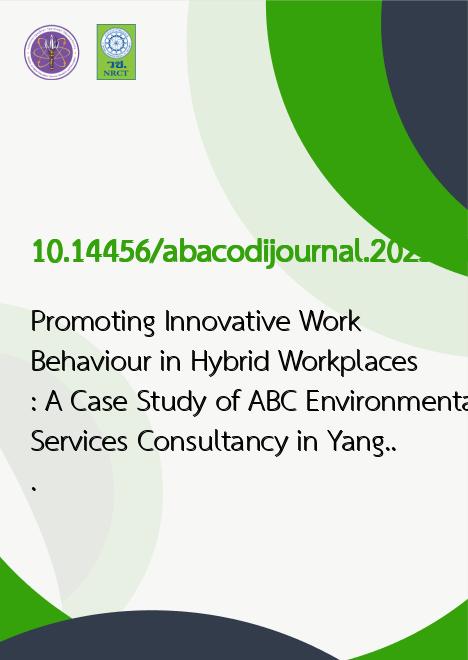
|
Promoting Innovative Work Behaviour in Hybrid Workplaces: A Case Study of ABC Environmental Services Consultancy in Yangon, Myanmar |
|---|---|
| รหัสดีโอไอ | |
| Creator | Shun Lei Lei Naing |
| Title | Promoting Innovative Work Behaviour in Hybrid Workplaces: A Case Study of ABC Environmental Services Consultancy in Yangon, Myanmar |
| Contributor | Maria Socorro Fernando, Nathaya Pupat |
| Publisher | Graduate School of Business and Advanced Technology Management - Assumption University Thailand |
| Publication Year | 2568 |
| Journal Title | ABAC ODI Journal Vision. Action. Outcome |
| Journal Vol. | 13 |
| Journal No. | 2 |
| Page no. | 47-74 |
| Keyword | Job Autonomy, Leadership Support, Effective Cross-Functional Collaboration, Work Engagement, Innovative Work Behaviour, Hybrid Work Arrangement |
| URL Website | https://assumptionjournal.au.edu/index.php/odijournal/index |
| Website title | ABAC ODI Journal Vision. Action.Outcome |
| ISSN | 2408-2058 |
| Abstract | Since the shift to hybrid and remote working models caused by the COVID-19 global pandemic, businesses must remain agile, competitive, and resilient. Those businesses and organizations where creativity and innovation are valued tend to thrive in unpredictable situations. This study explores employee perceptions of factors influencing innovative work behavior. This study provides insights into promoting innovative work behavior among employees in a hybrid workplace by assessing their work behavior and perceptions of innovation and work engagement. This mixed-methods study examines factors influencing innovative work behavior through a survey (n = 48) and individual interviews (n = 9). Quantitative data were analyzed using descriptive statistics, and the results showed generally positive employee perceptions, with innovative work behaviour rated the lowest among the five factors. Qualitative interviews, guided by the Appreciative Inquiry 5D Model, were analyzed through content analysis. Findings show that employees value team dynamics, job completion, and hybrid work arrangements, while also expressing a need for greater leadership trust, stronger work ethics, more autonomy, and clearer career pathways. The juxtaposition of the quantitative and qualitative results substantially contributed to providing strategic recommendations to promote innovative work behaviour. |